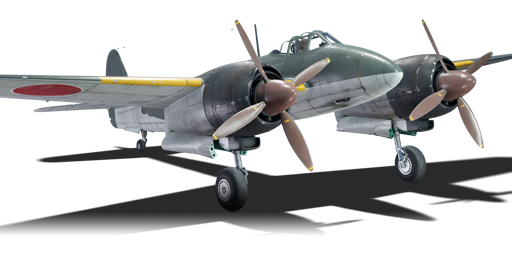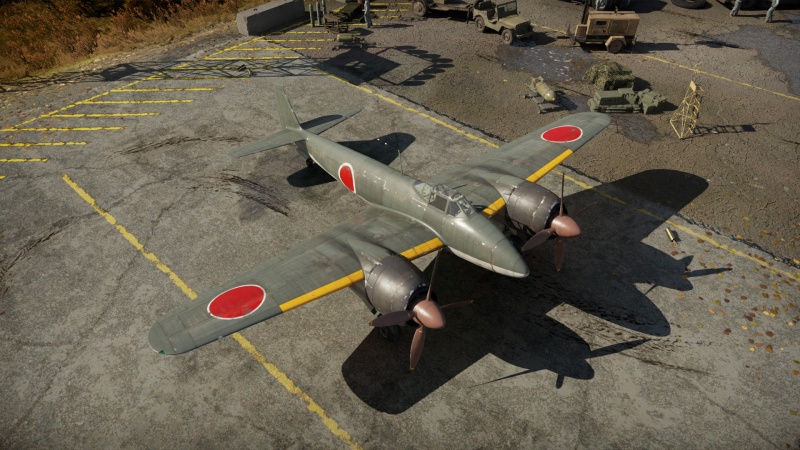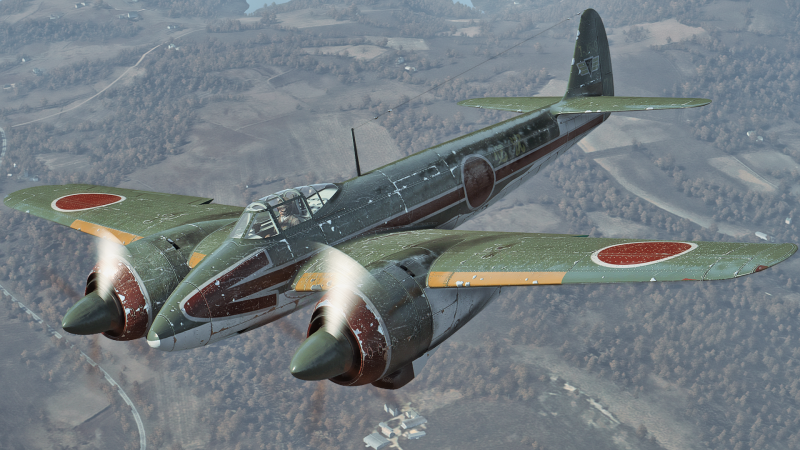J5N1
Contents
Description
The J5N1 is a rank Japanese twin-engine fighter with a battle rating of (AB), (RB), and (SB). It was introduced in Update 1.89 "Imperial Navy".
General info
Flight performance
| Characteristics | Max Speed (km/h at 6,500 m) |
Max altitude (metres) |
Turn time (seconds) |
Rate of climb (metres/second) |
Take-off run (metres) | |||
|---|---|---|---|---|---|---|---|---|
| AB | RB | AB | RB | AB | RB | |||
| Stock | 638 | 620 | 28.0 | 28.8 | 14.3 | 14.3 | 420 | |
| Upgraded | 690 | 663 | 26.5 | 27.0 | 22.6 | 18 | ||
Details
| Features | ||||
|---|---|---|---|---|
| Combat flaps | Take-off flaps | Landing flaps | Air brakes | Arrestor gear |
| ✓ | ✓ | ✓ | X | X |
| Limits | ||||||
|---|---|---|---|---|---|---|
| Wings (km/h) | Gear (km/h) | Flaps (km/h) | Max Static G | |||
| Combat | Take-off | Landing | + | - | ||
| 431 | 406 | 280 | ~10 | ~3 | ||
| Optimal velocities (km/h) | |||
|---|---|---|---|
| Ailerons | Rudder | Elevators | Radiator |
| < 320 | < 400 | < 450 | > 324 |
Survivability and armour
The J5N1 is not very durable. Although there is 70 mm thick bulletproof glass and 20 mm of steel armour protecting the pilot from the front, the aircraft is still quite fragile. Despite having self-sealing fuel tanks, fires are almost always lethal, typical of WW2 Japanese aircraft.
Modifications and economy
Armaments
Offensive armament
The J5N1 is armed with:
- 2 x 30 mm Type 5 cannons, chin-mounted (60 rpg = 120 total)
- 2 x 20 mm Type 99 Model 2 cannons, chin-mounted (350 rpg = 700 total)
Usage in battles
Similar to the previous aircraft in its tech tree branch, the J5N1 excels at hunting down enemy bombers. The heavy armament of the J5N1 allows it tear apart even the most heavily armed aircraft it will face, and it can gain remarkable amounts of speed in a straight line over time. Compared to the Ki-108 preceding it, the J5N1 also has substantially better vertical energy retention, allowing boom and zoom to be a somewhat more viable tactic. Pilots should be wary of approaching enemy bombers from behind, as although the pilot will probably be safe due to the aircraft's frontal protection, the rest of the aircraft is quite vulnerable.
This aircraft performs best when no enemy fighters lurk above it - although the J5N1 is surprisingly agile and quick for a twin-engine aircraft, competent enemy fighters with an altitude advantage will likely defeat it in a one-on-one engagement. Thus, similar to previous Japanese twin-engine interceptors, the aircraft excels when teammates are there to support you.
The J5N1's worst enemies are Bf 109s and Spitfires. The variants you will face at the J5N1's BR can both outclimb and outturn the J5N1 if piloted properly, and are tough to defeat in one-on-one engagements unless the J5N1 pilot comes in with an altitude advantage, element of surprise, or both. If you cannot find yourself above enemy Bf 109s or Spitfires, try avoiding them and see if your teammates can help you. Against Yaks and Lavochkins, try to engage them above 4,000 m/13,000 ft, as Soviet aircraft barring the likes of the I-225 tend to perform worse at altitude.
Manual Engine Control
| MEC elements | ||||||
|---|---|---|---|---|---|---|
| Mixer | Pitch | Radiator | Supercharger | Turbocharger | ||
| Oil | Water | Type | ||||
| Controllable | Controllable Not auto controlled |
Controllable Not auto controlled |
Controllable Not auto controlled |
Separate | Controllable 2 gears |
Not controllable |
Pros and cons
Pros:
- Devastating armament - its 30 mm cannons are both high velocity and very deadly
- All guns are mounted in the nose
- Surprisingly fast for a twin-engine aircraft - can exceed 700 km/h even in very shallow dives
- Improved vertical energy retention over previous heavy fighters means BnZ is more viable
Cons:
- Even with self-sealing fuel tanks, fires are almost always lethal
- Weak rudder
- Mediocre roll rate
History
Describe the history of the creation and combat usage of the aircraft in more detail than in the introduction. If the historical reference turns out to be too long, take it to a separate article, taking a link to the article about the vehicle and adding a block "/History" (example: https://wiki.warthunder.com/(Vehicle-name)/History) and add a link to it here using the main template. Be sure to reference text and sources by using <ref></ref>, as well as adding them at the end of the article with <references />. This section may also include the vehicle's dev blog entry (if applicable) and the in-game encyclopedia description (under === In-game description ===, also if applicable).
Media
- Skins
- Videos
See also
Links to the articles on the War Thunder Wiki that you think will be useful for the reader, for example:
- reference to the series of the aircraft;
- links to approximate analogues of other nations and research trees.
External links
- [Smithsonian] Nakajima J5N1 Tenrai (Heavenly Thunder)
- [https://www.militaryfactory.com/aircraft/detail.asp?aircraft_id=1511 [Military Factory] Nakajima J5N Tenrai (Heavenly Thunder)
- [Combined Fleet] Nakajima J5N Heavy Fighter/Interceptor
- Official data sheet - more details about the performance
| Nakajima Aircraft Company (中島飛行機株式会社 ) | |
|---|---|
| Fighters | Ki-27 otsu · Ki-27 otsu Tachiarai |
| Ki-43-I · Ki-43-II · Ki-43-III otsu | |
| Ki-44-I · Ki-44-I 34 · Ki-44-II otsu · Ki-44-II hei | |
| Ki-84 ko · Ki-84 otsu · Ki-84 hei | |
| Ki-87 | |
| Hydroplanes | A6M2-N* |
| Interceptors | J1N1 · J5N1 |
| Bombers | B5N2 |
| B6N1 Model 11 · B6N2 Model 12 · B6N2a Model 12Ko | |
| G5N1 · G8N1 | |
| Ki-49-I · Ki-49-IIa · Ki-49-IIb · Ki-49-IIb/L | |
| Recon | E8N2 |
| Jet Fighters | Kikka |
| Captured | ␗Ki-27 otsu · ▃Ki-43-II · ␗Ki-43-III ko · ␗Ki-44-II hei · ␗Ki-84 ko |
| *Refit of the Mitsubishi A6M2 mod. 11 | |
| See also | Fuji Heavy Industries (1957-2017) |
| Japan twin-engine fighters and strike aircraft | |
|---|---|
| Navy | |
| Land-based Fighter | |
| J1N | J1N1 |
| J5N | J5N1 |
| Army | |
| Ki-45 | Ki-45 ko · Ki-45 otsu · Ki-45 hei · Ki-45 tei |
| Ki-83 | Ki-83 |
| Ki-96 | Ki-96 |
| Ki-102 | Ki-102 otsu |
| Ki-108 | Ki-108 Kai |
| Ki-109 | Ki-109 |






